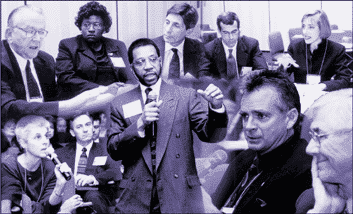 Participants at NIDA's Constituent Conference included (clockwise from upper left): William Dewey, American Society for Pharmacology and Experimental Therapeutics; Angela Sharpe, Consortium of Social Science Associations; David Rosenbloom, Join Together; Geoffrey Mumford, American Psychological Association; Susan Foster, National Center on Addiction and Substance Abuse, Columbia University; Charles Schuster, College on Problems of Drug Dependence; Brunie Emmanuel, National Council on Alcoholism and Drug Dependence; T. Allen Gore, Black Psychiatrists of America; William Corrigal, Society for Research on Nicotine and Tobacco; and Kay Paine, Join Together.
Participants at NIDA's Constituent Conference included (clockwise from upper left): William Dewey, American Society for Pharmacology and Experimental Therapeutics; Angela Sharpe, Consortium of Social Science Associations; David Rosenbloom, Join Together; Geoffrey Mumford, American Psychological Association; Susan Foster, National Center on Addiction and Substance Abuse, Columbia University; Charles Schuster, College on Problems of Drug Dependence; Brunie Emmanuel, National Council on Alcoholism and Drug Dependence; T. Allen Gore, Black Psychiatrists of America; William Corrigal, Society for Research on Nicotine and Tobacco; and Kay Paine, Join Together. Putting research findings to actual use was the theme of NIDA's Sixth Annual Constituent Conference in December 1999. More than 60 individuals representing 48 consumer and professional organizations concerned with drug abuse research, treatment, and prevention attended the meeting in Chantilly, Virginia. At each meeting, NIDA presents its latest research findings, program accomplishments, and initiatives to the field. The constituent leaders voice their most pressing concerns and recommendations to the Institute.
"The recommendations we receive from constituent organizations are critically important to our work," NIDA Director Dr. Alan I. Leshner told the group. "We need to hear from you how we can best translate our research findings into actual programs in communities. We need specific information from you on what you believe will work in particular situations."
Each year, NIDA prepares a "report card" that illustrates how the Institute acted in response to the constituents' recommendations from the previous year. (See "NIDA's Report Card Details Research Initiatives, Resources, and Accomplishments,") The constituent groups also compile their own "report cards," summarizing their activities over the past year in research dissemination, collaboration with NIDA and other organizations, and joint projects with other members of the drug abuse research, prevention, and treatment community.
Jeffrey Blodgett, coordinator of the Alliance Project, spoke to participants about the efforts being made by the Alliance Project to serve as a focal point for coordination and a resource to organizations and activists in the field. Constituents also had an opportunity to comment on the draft NIDA Strategic Plan and receive updates on NIDA's outreach activities, including the Kmart Kids Race Against Drugs and the 1999 PRISM Awards.
